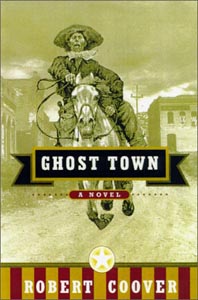Rewired Western
By Allen Barra
A FEW DECADES ago, Mary McCarthy, responding to a query about the direction of the American novel, told the new generation to "go back and fill in the genres." What she meant was that the rich but crude veins of American genre fiction--detective stories, Westerns, horror stories, etc.--had been around long enough to be refined for a generation of readers now familiar with their conventions.
Robert Coover might have heard McCarthy. For nearly a quarter of a century, he's been "filling in" all kinds of genres, from the murder mystery (Gerald's Party) to the baseball novel (The Universal Baseball Association, Inc., J. Henry Waugh, Prop.) to fairy tales (Briar Rose), to movie novelizations (You Must Remember This). With his new novel, Ghost Town, Coover has now metafictionized (to borrow a trendy term that Coover has helped create) the Western.
For decades, the American Western novel meant truck-stop paperback racks filled with works by Zane Grey, Max Brand and Louis L'Amour, but starting in the later '60s (or just about the time the Western stopped dominating TV and movies), American novelists started producing Western fiction not intended for pulp readers: Thomas Berger's novel about Custer, Little Big Man; Ron Hansen's novels about Jesse James and the Dalton Gang, The Assassination of Jesse James and Desperadoes; Pete Dexter's novel about Wild Bill Hickok's last days, Deadwood; and Cormac McCarthy's Blood Meridian come to mind.
All of them dealt with the Old West in a more or less realistic fashion. Ghost Town, on the other hand, might be billed as the first phantasmagorical Western. Actually, Ghost Town isn't so much a Western as a novel about Westerns.
A "forlorn horseman on the desert plain" approaches a small town that, no matter how hard he rides, recedes into the horizon. Finally, he thinks to approach the town from behind--not only does he reach it but the town rolls in under his horse, as if in greeting.
Like a town in a science-fiction movie (in fact, like the town in Dark City), the town is constantly changing--after a gunfight or bank robbery, the buildings shift, rearrange, metamorphose. So does our hero, changing from outlaw to sheriff and back again.
The violence in Ghost Town is as horrifically real as in a Cormac McCarthy novel, and the flat, natural descriptions leave nothing to the imagination: "The one-eared man's head splits with a pop as a clay bowl might, and his brains ooze out like spilled oatmeal." But no one is killed in Ghost Town, or rather no one stays killed. Like familiar actors who die in one Western film only to pop up in another, the characters in Coover's novel get shot, stabbed and hanged, only to reappear in different guises.
Coover's real concern is with the mythology of the Western. The forlorn horseman is "a drifter ... whose history escapes him even as he experiences it, and yet to drift is to adventure ..." What he's drifting through is our consciousness, filled with Western movies and TV clichés. "I wuz afierd," he says, "I'd hafta spend my whole goddamn life insida cock'n bull made up by other people. Mostly dead people."
Your reaction to Ghost Town is less likely to hinge on your feelings about Westerns than about metafiction in general. There are those among us who find the works of William Gaddis, John Barth, Thomas Pynchon and others of this group of middle-aged northern and Midwestern WASPs to be more fun to discuss as theory than to read, and there's no denying that Coover shares their bias for self-conscious technique over content and narrative.
Coover, though, also possesses gifts more associated with traditional fiction. For one thing, he has an ear for American idiom utterly lacking in the writers he's often grouped with: "Shet yer lip, 'fore I dissect yer innards and make sausages outa 'em for my dawg's breakfast"; "you pestiferous jugheaded scrag."
This, as someone in Mel Brooks' Blazing Saddles says, is authentic frontier gibberish. It's also funny, as is much of Ghost Town, which is another significant way Coover's work differs from that of his contemporaries. You can't read Ghost Town without conjuring up the ghosts of a thousand old Westerns, and you may not be able to see Westerns in the future without thinking of Ghost Town. Robert Coover has filled in this genre very well.
[ San Jose | Metroactive Central | Archives ]
![]()
 Robert Coover's 'Ghost Town' rides the frontier of our cowboy memories
Robert Coover's 'Ghost Town' rides the frontier of our cowboy memories
Ghost Town by Robert Coover; Henry Holt; 147 pages; $24 cloth.
From the October 15-21, 1998 issue of Metro.
![[Metroactive Books]](/books/gifs/books468.gif)